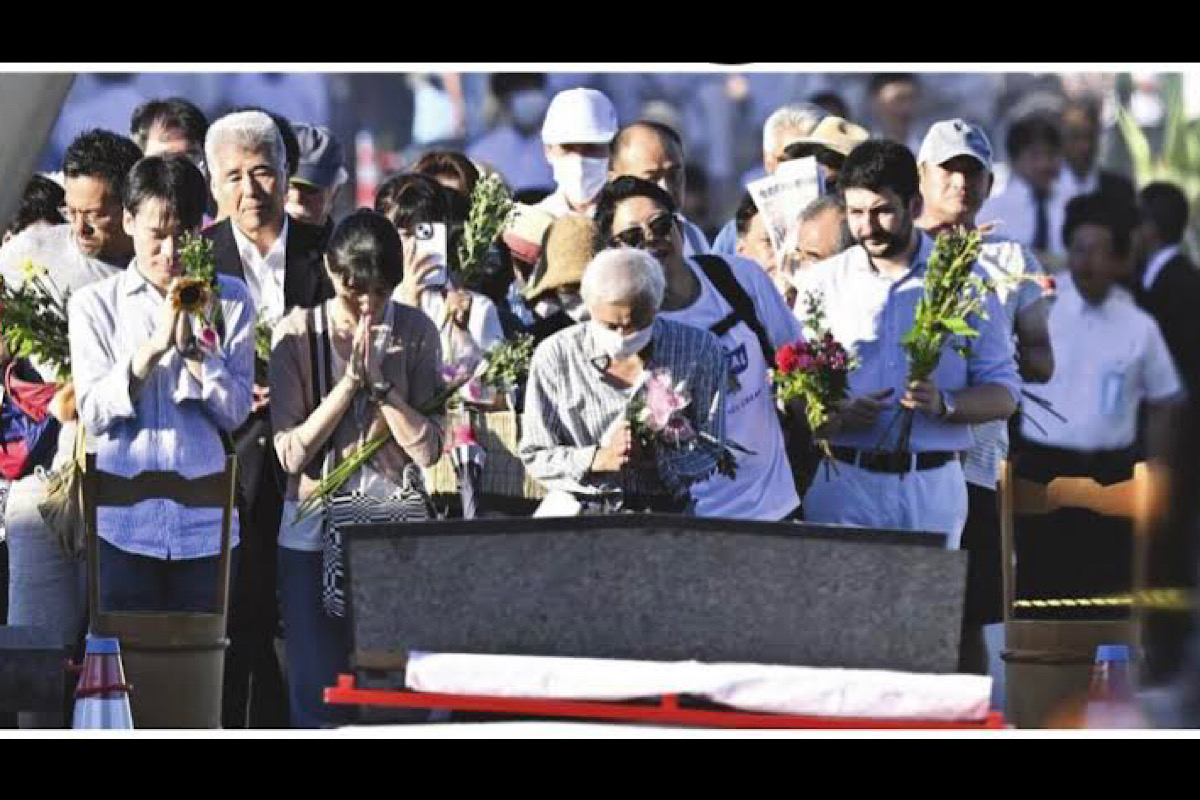Rain helps contain wildfire in Japan’s Iwate
Steady rainfall on Wednesday has helped contain the spread of a week-long wildfire in Ofunato City of Japan's Iwate Prefecture, local media reported.

Representation image (Photo :SNS)
The 78th anniversary of the atomic bombings of Hiroshima and Nagasaki directs one to explore the ground reality and perceptions of realpolitik in today’s world. Climate change which has seen a profusion of intentions and actions in recent times is clearly a global priority, intrinsically linked to development goals. In this framework, how must we reflect on the anniversary of the brutal bombings? On the one hand, the twin pillars of national security and economic development point to the goals of having a progressive world. On the other hand, the recent war of Russia in Ukraine throws up questions of insecurity, invasion, forced migration and lack of peace.
The situation is made tenser by the threat of nuclear weapons by Russia on Ukraine to end the war. This was absolutely the same goal the United States had in bombing Hiroshima on 6 August 1945 with 15 kilotons of Uranium bombs, and Nagasaki on 9 August 1945 with 25 kilotons of Plutonium bombs. Professor Thomas Shelling, Columbia University said in both his book and lecture that the bombs were thought of as a solution to end the war.
Advertisement
Morally presented, it saved soldiers’ lives, about 250,000 of them on both sides – the allies and the Japanese. The Hiroshima bombing, “Little Boy” achieved that ostensibly, but the Nagasaki bombing, “Fat Man” three days later, that too when there were indications of total surrender by the Japanese, was brutal and cruel. At this point, it is worth remembering J Robert Oppenheimer said that the atomic bomb was used “against an essentially defeated enemy”. The two bombs were perceived more as a techno-political imperative than a military one.
Advertisement
By dropping an untested Uranium bomb on Hiroshima and then nuking Nagasaki with a Plutonium bomb, the United States sought to globally demonstrate its unmatched destructive power. Especially against its rival – the former Soviet Union. The bombings achieved their aim i.e., to stop World War II but with horrific consequences. In light of this, the United States claiming a certain kind of ethics and morality to this day is a tremendously weak argument. Taking off from this, when India constructed its nuclear argument and tested its first implosion device in 1974, “Smiling Buddha”, it meant to push forward the essential argument that it would bring India power – power for the nation and power to sit at the high table with other nuclear capable nations in order to construct high politics.
Only a small number questioned its ethicality or morality within and outside. Slowly but surely, India gained more than a foothold in the international community with a second nuclear explosion in 1998 with Dr. Abdul Kalam, later President of India, called the Missile Man advocating not the use, but the setting up of nuclear architecture as defence. He was as moral a man as maybe J Robert Oppenheimer has been shown to be, well versed in the vedas and scriptures of Hinduism.
Existentially both Oppenheimer and Kalam, the former a Christian, and latter a Muslim, felt they had a duty to perform for the nation, yet worried about morality. A little-known fact in this debate of reality versus morality is that Father George Zabelka, a Catholic chaplain with the United States Air Force, served as a priest for the airman who dropped the atomic bomb on Hiroshima and gave them his blessing on the tarmac. Days later, he counselled an airman who had flown a low-level reconnaissance flight over the city of Nagasaki shortly after the detonation of “Fat Man”.
The man described how thousands of scorched twisted bodies writhed on the ground in the final throes of death, others on their feet wandered aimlessly in shock as their flesh melted off. The crewmen’s description raised a stifled cry from Zabelka’s soul, “My God, what have we done?” Over the next 20 years he struggled to come to terms with this, and one of the pilots was till his death under psychiatric care. The Christian theology and the Just War concept were not a consideration, especially when the second bomb was dropped. The logic and principles behind nuclearization have to be debated, especially in the light of the Russian threat of nuclear war against the use of any NATO troops going forward.
The world cannot face another World War. And another Hiroshima or Nagasaki cannot happen to any nation, under any circumstances in contemporary modern-day politics. Not when there are other real and present threats posed to the global community in the form of climate change. Globally, nuclearization needs to be routed towards not aiding in militarisation, but in supporting low-carbon energy future and other alternatives. India’s stand too, needs rethinking and vital exploring of viable alternatives.
Foreign policy should be of course, thoughtfully plotted and be relevant to India’s strategic posture.
(The writer is a political science analyst and retired Associate Professor, Department of Political Science, Lady Shri Ram College, University of Delhi.)
Advertisement